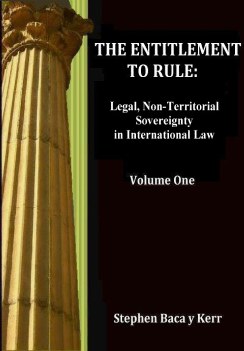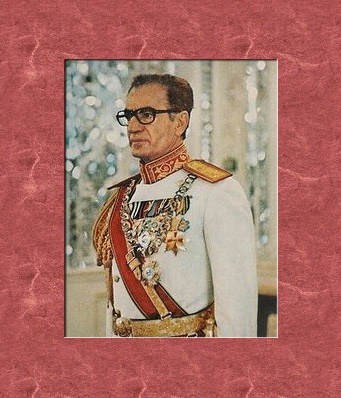The International Commission on Nobility and Royalty
(See Additional Articles below)
DEPOSED SOVEREIGNTY AND ROYALTY: How to Preserve it and How it can be Lost 

All the major legal principles that promote genuine and authentic nobility, royalty and chivalry are contained in the following new two volume book. Note what is says in the first paragraph of the Foreword:
The whole field of nobility and royalty is in disarray and confusion. It is rife with falsehoods, misguided experts, phony princes, and counterfeit chivalric orders. Besides the numerous scams and charlatans that exist, there is a widespread misunderstanding of the international and natural laws that govern dynastic rights. This is a field that is truly divided. This sad state of affairs need not continue. If international law is honored, revered and respected, then everything can be set in its proper order. The grand key to this needed unity is the rule of the just, time-honored laws that already exist.
The author is Dr. Stephen Baca y Kerr, JD, LLM, MAT, former special counsel to the Imperial and Royal House of Habsburg, Professor and Dean of the Law School at the International College of Interdisciplinary Studies. His book is The Entitlement to Rule: Legal, Non-Territorial Sovereignty in International Law and it is a masterpiece. Note excerpts of what people have said about it:
"It is written in a clear and compelling manner. It is hoped that more and more people will become familiar with the laws of justice contained in this book." (Thubten Samphel, director of the Tibet Policy Institute of the Central Tibetan Administration and author of the book Falling Through the Roof, Dharamshala, India)
"It is magnificently done and of great worth." (Adalberto J. Urbina Briceno, Sc.D., Professor Head of the Public International Law Chair of the Catholic University Andres Bello- Caracas)
"It is a goldmine of references and is a valuable account of a [thought provoking] . . . and poorly understood area of law." (Rev'd Professor Noel Cox, LLM, MA, MTheol, Ph.D., LTh, FRHists, Barrister, Aberystwyth University, New Zealand)
"Dr. Kerr has put together a book that is a "one of a kind" providing what is needed to perpetuate the rights of deposed sovereignty. For all those interested in the legal future of nobility and royalty, this is a very important, scholarly and insightful book to read." (LaWanna Blount, Ph.D., F.Coll.T, vice president and professor at the American College of Interdisciplinary Sciences, Como, Mississippi, USA)
"Dr. Kerr's book . . . is one of those . . . path breaking works that throws new light on a field of study . . . on the complex legal and philosophical sinews that keep alive [deposed] monarchies. . . . This type of writing fills a huge gap within the royal studies field. . . ." (Dr. Diana Mandache, historian and author, Budapest, Romania)
"The author obviously has a deep understanding of international law and how it relates to deposed monarchies and exiled governments. The content is well structured and well written. I accept this book as conforming to the highest academic standards expected of a master scholar and practitioner." (Alexander Arapov, Sc.D., Professor of the Department of Philosophy and Sociology of the All-Russian State Distance-Learning Institute of Finance and Economics, a branch of the Financial University of the Russian Federation)
"This has been the most interesting and helpful book I have read in the field of nobiliary law as well as international law . . . . It exemplifies the highest level of scholarly content, clarity and depth of inquiry yet presented on this profound and important subject." (Prof. Dr. Mirjana Radovic-Markovic, Academician, Institute of Economic Sciences and Faculty of Business Economics and Entrepreneurship, Belgrade, Serbia)
This unique book is being offered for free because of its singular importance to the field of nobility and royalty. Go to the website: www.entitlement-to-rule.info.
 PRESERVATION AND LOSS OF DYNASTIC RIGHTS
PRESERVATION AND LOSS OF DYNASTIC RIGHTS
Purpose
One must be wary and careful and be fully informed not to be deceived by some of the charlatans or bogus princes who skillfully fight the truth and purposely blur legal realities in order to lead people astray or take advantage of innocent, unsuspecting potential victims. It is very important to understand the basic inherent facts about sovereignty and royalty, so one is not taken in by those who masquerade as authentic, but who are really only impostors, who impersonate what is real, genuine and true. Then there are the true and rightful claims. The ability to see through falsehoods is important. We live in a time where there are more counterfeits than at any other time in the history of mankind.
Article Table of Contents:
 Sovereignty Basics and Royalty
Sovereignty Basics and Royalty
 This article focuses on deposed monarchies --- the "de jure," internal or non-territorial rights of sovereignty legally possessed by deposed royal houses. The concepts and principles of law explained herein are not to be confused with the requirements for reigning houses that possess defacto or actual control of the country although many of the fundamentals apply to both.
This article focuses on deposed monarchies --- the "de jure," internal or non-territorial rights of sovereignty legally possessed by deposed royal houses. The concepts and principles of law explained herein are not to be confused with the requirements for reigning houses that possess defacto or actual control of the country although many of the fundamentals apply to both.
"De jure" or legal sovereignty is extremely important to the field of nobility and royalty. Without these priceless rights and entitlements, eveything is mere fantasy --- nothing is real. The reason for this is that no sovereign rights means there is no "fons honorum" or right to honor, which means no authentic or genuine orders of chivalry are possible. In other words, no sovereignty means no right to use the royal prerogative, because there is no royal prerogative.
The point is, since by definition, "sovereignty" is "royal rank, power, or authority." If sovereignty is lost, so is royal rank and all that goes with it including regal titles and all royal rights and prerogatives. (Westster’s II New Riverside University Dictionary, “Sovereignty,” 1984, p. 1112) This article is on how sovereignty and royalty can be irreparably lost and how it can be legally maintained.
The word "royal" began in the 13th century and meant "on a grand scale." (Dictionary.com, 2011: http://dictionary.reference.com/browse/royal#wordorgtop) It is now generally used to describe monarchs of large territories and their close family members, but in the past, it always revolved around "the office, state or right of a king," which is sovereignty. (A Compendious Dictionary of the English Language, "Royalty" & "Royalties," 1806) ". . . The nation has plainly and simply invested him with [all the glory of] sovereignty . . . invested with all the prerogatives. . . . These are called regal prerogatives, or the prerogatives of majesty." (Emerich de Vattel, The Law of Nations, Book 1, chapter 4, no. 45) Thus, a king or sovereign prince has ". . . in his own person all the rights to sovereignty and royalty. . . ." (William Rae Wilson, Esq., Travels in Norway, Sweden, Denmark, Hanover, Germany, Netherlands, &c., Constitution of the Kingdom of Denmark (1826 time frame), appendix no. 16, article 6, 1826, p. 72) No one else in the kingdom has all these rights in their fullness other than the king or ruling prince. Royalty belongs only to monarchs and close family members -- not to distant relatives or offshoot lines, who are not dynasts and have no succession rights as collaterals.
Sovereignty is the highest and most importance secular right on earth. It is above all others things including all royal dynastic rights. The subordination and dependence of royalty on the possession of sovereignty is of great importance to discern what is fake from what is true and authentic. All royal rights come from and grows out of the rights, entitlements and privileges of sovereignty. A king or sovereign prince is royal only because he holds these right as an individual.
Even though the president of a republic, especially in modern times, may actually be more powerful than any king that ever lived, yet he is not a sovereign, nor does he hold any kind of regal status. A president is merely a representative of his nation or country and nothing more. Whereas, a monarch is a royal, because he is the personification of all the glory of sovereignty over the people or the land of his forefathers. This is to be the embodiment of something grand and exalted.
people or the land of his forefathers. This is to be the embodiment of something grand and exalted.
Thus, royal rank and status are "the [exclusive] prerogatives of sovereignty," the "emblems [or symbols] of sovereignty," and the "embodiment of sovereignty." (Webster's Third New International Dictionary, unabridged, Philip Babcock Gove, ed., "royalty," 1961, p. 1982) Sovereignty is, therefore, a central concern or core issue --- crucial to all the privileges and honors that go with it. For without it, dynastic rights do not exist.
All of the following regal rights are inseparably connected to reigning and non-reigning sovereignty. Some of the qualities are inactive with monarchs, who are limited or deposed, but all true sovereigns hold all the following rights either dormantly in abeyance or in an active state:
(1) Jus Imperii, the right to command and legislate,
(2) Jus Gladii, the right to enforce ones commands,
(3) Jus Majestatis, the right to be honored, respected, and
(4) Jus Honorum is the right to honor and reward.
There is no division between legislative and enforcement rights and the right to honor and be honored. Sovereignty is not sovereignty if it is not composed of all four elements that comprise this important quality. In other words, there is no such thing as holding only the right to be honored and the right to honor others and not also hold the right to command and the right to make laws. One must have all four characteristics or one does not hold the highest of all secular rights -- the right or entitlement to rule. In other words, by analogy, one can't be partially pregnant, sort of dead, kind of human, or almost sovereign. Supremacy is an all or nothing quality for either a reigning dynasty or a deposed royal house. All four qualities equal, or amount, to sovereignty. Anything less is non-sovereign. As stated below:
It is certain that sovereignty comprehends the exercise of four fundamental rights: the JUS IMPERII, which is the right of command; the JUS MAJESTATIS, which is the right to be honored, respected and protected; and the JUS HONORUM, which is the right to reward merit and virtue. (Charles Louis Thourot Pichel, Samogitia: the Unknown in History, 1975, p. 306-307)
Dispossessed royal houses continue to hold all four rights of sovereignty even though two are inactive:
When the sovereign loses the territory, on which he used to exercise the JUS IMPERII and the JUS GLADII, he does not lose the [four] sovereign rights. He still conserves IN PECTORE [in abstentia] and IN POTENTIA [in potential] the above-mentioned rights [all four of them], of which the effective exercise is [merely] suspended. . . . (Ibid.) (emphasis added)
There is no difference between deposed sovereignty and reigning sovereignty except in form. They are fundamentally the same. The dispossessed king or sovereign prince still holds the right to legislate and enforce even if he is deposed, because he still holds the legal right, not the power, but the legal entitlement to rule as long as he, and his successors, continue to perpetuate this right.
 The above rights are inseparably connected as fundamental attributes of sovereignty. If legal internal sovereignty is lost or forfeited in any way, there are no royal (grand, exalted or special) rights left. In other words, all the special qualities of royalty are lost if sovereignty is lost.
The above rights are inseparably connected as fundamental attributes of sovereignty. If legal internal sovereignty is lost or forfeited in any way, there are no royal (grand, exalted or special) rights left. In other words, all the special qualities of royalty are lost if sovereignty is lost.
 Introduction to the Preservation and Loss of Sovereignty and Dynastic Entitlements
Introduction to the Preservation and Loss of Sovereignty and Dynastic Entitlements
There are many royal families on the earth, who have legally maintained their sovereign status even though they no longer are in power reigning over a territory, kingdom or principality. For example:
There are in all more than forty sovereign houses of Europe, but all do not reign over independent lands or principalities. Although many of these houses possess only the title of sovereignty and the right of royal privileges, they are equal in rank to all reigning houses, and their members intermarry freely without loss of title or rank. (George H. Merritt, "The Royal Relatives of Europe," Europe at War: a "Red Book" of the Greatest War of History, 1914, p. 132)
In other words, ". . . The king [or sovereign prince] does not forfeit the character of royalty merely by the loss of his kingdom. If he is unjustly despoiled of it by an usurper, or by rebels, he still preserves his rights. . . ." (Emerich de Vattel, The Law of Nations, Book II, chapter XII, no. 196)
In other words, deposed sovereignty can be without end provided it is maintained by the rules and principles of "prescriptive" law. If the rules are violated, royal status is irretrievably lost, which means all regal rights and privileges are forfeited. A person who has no dynastic entitlements cannot restore or pass on to posterity something he does not have and does not own.
Those who say that dynastic rights of deposed houses, which is de jure internal, non-territorial sovereignty, cannot be lost, except by perhaps by debellatio, really have no idea what they are talking about. Sovereignty and royalty can be permanently lost in many different ways, not only for individuals and/or their posterity, but for whole dynasties. The following are a few of these ways:
A. Abdication and/or renunciation
B. Dereliction and neglect
C. Cession by treaty, will or some other arrangement, such as, by estoppel creating an immediate loss or forfeiture of all rights
D. "Inter-vivos" transfer, sale or mortgage in ancient or modern times
E. Tyranny, oppression or crimes against humanity
F. Papal or Imperial confiscation of all royal rights and instituting a new dynasty as done in the past
G. Abandonment either overtly or by acquiescence or neglect
H. Marriage without permission
I. Unequal marriage
J. Religious Laws regarding succession
K. Prescription
L. Debellatio
M. Extinction
N. Disinheritance and exclusions
O. Consitutional stipulations and house rules
P. Designations of who or what family will or will not have direct line or collateral succession rights
Some of the above methods of loss would affect individuals and their families only, while others would impact a whole dynasty wherein the regal claim would cease to exist and they would become mere commoners with no entitlement greater than anyone else in the nation.
 Lose of all Rights and Entitlements
Lose of all Rights and Entitlements
"If the Sovereign [has] abdicated or been lawfully deposed . . . his legal title to international rights and favours has ceased." (Robert Phillimore, Commentaries Upon International Law, vol. 2, 1871, p. 142) That is, not only is such a person without valid legal title under domestic law, but also under international law. He or she has lost every royal and sovereign privilege -- no longer having a legal and lawful public right to anything regal, supreme or grand. This kind of loss of every dynastic right is equally true of a deposed house that neglects their rights. Because:
. . . After so many years of prescription [that is, 50 to 100 years of negligent abandonment of their once valid royal claims] our [former or deposed] kings and emperors [forfeit or] have lost all those true and ancient imperial rights [of rulership and royal privilege]. . . . (Quote from Hermann Conring (1606-1681) in Constantin Fasolt, Past Sense — Studies in Medieval and Early Modern European History, 2014, p. 364)
It ceases to exist by natural law.
The point is, "The extravagant doctrines [that deposed dynastic rights can never be lost, in other words] . . . concerning the indefeasibility of hereditary claims, and the imprescriptibility of royal titles, form no part of the law of nations." Philipp Melancthon (1497-1560), "Art.18: Melancthon’s Letter to Dr. Troy, " The Annual Review, and History of Literature, vol. 4, Arthur Akin, ed., 1806, p. 263. In other words, ". . . The rights of a [deposed] dynasty, however ancient, however celebrated, however illustrious [can be] annulled, extinguished, as if they had never been [or never existed]." ("The New French Dynasty," The Metropolitan: a Monthly Magazine, devoted to Religion, Education and Literature, and General Information, vol. 2, no.1, February 1854, p. 41)
". . . The sovereignty held by the displaced [deposed] legal sovereign is known as De jure [or non-territorial] Sovereignty." (Johann Wolfgang Textor, Synopsis of the Law of Nations, 1680, chapter XIV, no. 8) (emphasis added) "A deposed monarch remained [that is, continues], in law, a [de jure, legal or rightful] monarch." (Charlotte Catherine Wells, Law and Citizenship in Early Modern France, Issue 1, 1995, p. 198) (emphsis added) That is, this takes place for deposed sovereignty provided the king or sovereign prince, and his successors in every generation, continue to obey the law of prescription which preserves and maintains this supreme and grandest of all secular qualities.
"Dynastic rights [by definition for reigning or non-reigning monarchs are] the rights of a given family to rule." (Francis Andrew March and Francis Andrew March, Jr., A Thesaurus Dictionary of the English Language, 1906, p. 919) A family possession, either non-reigning or regnant sovereignty, is, by definition, their dynastic right. If legal, non-territorial sovereignty is forfeited for the family, then all the rights of a dynasty are terminated with it, because you cannot, by definition, have dynastic rights without the possession of sovereignty.
". . . Former rulers [can] forfeit their right to the government [that is they can lose their sovereignty both on a de jure and de facto level]. . . . Were the obsolete claims of a deposed dynasty to be perpetually revived, the peace [and security] of society would be continually agitated [and disturbed].” (John Machale, The Evidences and Doctrines of the Catholic Church, 2nd ed., 1842, pp. 308-309) Hence, it is a natural law that deposed dynasties that fail to maintain their rights, lose their all their rights.
The point is, according to this law, ". . . All titles [including dynastic ones] terminate [or end] in Prescription. . . ." (Edmund Burke, Works of Edmund Burke, vol. 9, p. 449, 2005, p. 450) That is, "immemorial prescription cuts off [bars or destroys] all [including dynastic] claims." (Adam Smith, The Glasgow Edition of the Works and Correspondence of Adam Smith (1981-1987), vol. 5, Lectures on Jurisprudence, R. L. Meek, D. D. Raphael and P. G. Stein, eds., 2004, p. 72)
 Prescriptive Law
Prescriptive Law
The preservation and loss of rights are determined chiefly and predominantly by prescription, one of the major ways to forfeit a whole dynasty, which is a natural law concept in international law. It is so important to the future of "de jure" nobility and non-reigning royalty, chiefly because this law is part of what governs the ". . . position and status of unlawfully dethroned Sovereign Houses." (Stephen P. Kerr, "Resolution of Monarchical Successions Under International Law," The Augustan, vol. 17, no. 4, 1975, p. 979) Prescription is a fundmental concept of royalty and sovereignty. For example:
Dynasticism . . . [is] bound up with the principle of prescription. Indeed it might almost be said that prescription, not dynasticism, [or, in other words, prescription rather than dynastic law] provided the original rule [or key for the determination] of legitimacy." (Martin Wight, "International Legitimacy," International Relations, vol. 4, April 1972, pp. 1-28)
The rules and principles of "prescription," as juridically binding actions, are still used to determine the validity and legitimacy of "de jure" internal non-territorial sovereigns in our day and age. That is, ". . . international law cannot be said to admit the imprescriptibility of sovereignty." (Eelco van Kleffens, Recueil Des Cours, Collected Courses, 1953, vol. 82, 1968, p. 86) Why? Because not only have ancient royal houses lost their internal "de jure" claims to sovereignty for centuries by this fundamental means, but modern international courts have also sustained and upheld the forfeiture or permanent loss of deposed sovereignty by the same formal rules and principles of "prescription."
These important concepts need to be explained and understood. For example, to believe the idea that ". . . sovereignty formally implies a power that is absolute, perpetual, indivisible, imprescriptible and inalienable" is to believe in fairy tales or nonsense. Sovereignty may imply the above, but in real life sovereignty is not almighty, supernatural and everlasting as some want to you to believe. The truth is:

[Sovereignty] has been dividied and subdivided, acquired and lost, restricted and enlarged, times without number, and by various means, during the world's history. . . . The history of the world is full of examples of two or more nations being merged into one, and of one divided into two or more; of sovereignty lost by conquest or by voluntary surrender, and sovereignty acquired by rebellion or voluntary association. To say that a State cannot surrender or merge her own sovereignty, is to deny the existence of sovereignty itself; for how can a State be sovereign [having supreme power above all other things in life and not be able to] . . . dispose of herself? (Amos Kendall, Autobiography of Amos Kendall, William Stickney, ed., 1872, p. 597)
If sovereignty was indivisible, ". . . what became of the "indivisible" sovereignty of the British Empire when it was divided into twelve or thirteen independent States?" (Ibid., p. 596) Obviously, sovereignty is not absolute, perpetual, indivisible, imprescriptible, because it has always been limited, divisible, prescriptible and alienable. The point is:
Indivisibility of sovereignty . . . does not belong to international law. The power of sovereigns are a bundle or collection of powers, and they may be separated one from another. (Sir Henry Maine, International Law, 1890, p. 58)
"Absolute inalienability charaterizes no kingdom [or state] in this world. . . ," because "sovereignty is divisible [is alienable], both as a matter of principle and as a matter of experience." (F. Peter Collingridge, The Civil Principality of the Vicar of Christ, 1889, p. 90 and Ian Brownlie, Principles of Public International Law, 2008, p. 113) ". . . Defining sovereignty as inalienable, unlimited, irrevocable, and imprescriptible, ran time and again into inherently fickle dynastic practice." (Benno Teschke, The Myth of 1648, 2003, p. 228) Examples of the how dynastic sovereignty was alienable, revocable and prescriptible, etc. are myriad. Example after example exists in the history of mankind to prove this. (Ibid., pp. 228-229) Johann Wolfgang Textor, considered to be one of the late founders of international law, made it clear and unmistakable that "prescription of kingly sovereignty" is a well-known legal fact. (Synopsis of the Law of Nations, chapter 10, no. 18) How this takes place is a serious matter, because dispossessed hereditary sovereignty can be lost, and lost forever, without practically any recourse for recovery or renewal.
In fact, "Any right . . . [including dynastic rights] the right of sovereign title, may be prescribed. . ." or lost. (William Cullen Dennis, Chamizal Arbitration: Argument of the United States of America, 1911, p. 114) The point is, ". . . There is not strictly, in human nature, any such thing as an absolutely indefeasible right [that is, by definition, something incapable of being annulled or rendered void]. Sovereign right itself furnishes no exception to this general principle." (Edward Smedley and Hugh James Rose, Encyclopaedia Metropolitana; or, Universal Dictionary of Knowledge, vol. 2, 1845, p. 714)
incapable of being annulled or rendered void]. Sovereign right itself furnishes no exception to this general principle." (Edward Smedley and Hugh James Rose, Encyclopaedia Metropolitana; or, Universal Dictionary of Knowledge, vol. 2, 1845, p. 714)
 Heredity Rights cannot maintain Regal Rights for the Deposed
Heredity Rights cannot maintain Regal Rights for the Deposed
The point is, ". . . the Rights of Princes to their thrones are . . . Legal Rights . . ." through prescription. (“An Inquiry into the Nature and Obligation of Legal Rights, A Collection of State Tracts, publish'd during the Reign of King William III, vol. 2, 1705, p. 394) "[Both internal and external] sovereignty is . . . merely [a] legal conception. . . ." (Neil MacCormick, Questioning Sovereignty: Law, State, and Nation in the European Commonwealth, 1999, p. 127) Since sovereign entitlement ". . . is conferred by law . . . ," it can also be taken away or terminated by law. (Ibid.) In other words, the law giveth and the law can take away. Dynastic or hereditary rights are:
. . . human laws . . . [that] enable men to transmit with their blood property, titles of nobility, or the hereditary right to a crown. These privileges may be forfeited for himself and his posterity. . . . They may be forfeited for posterity, because they are not natural rights. ("Problems of the Age," Catholic World, vol. 4, October 1866 to March 1867, p. 528)
The assertion that dynastic rights can never die, has been proclaimed by some imposters who make bogus claims, but they can never prove their theory. The fact is, no law, no statute or ordinance is ever cited, except "jus sanguinis" to support this idea. The problem with hereditary right maintaining deposed sovereignty is that it is not full proof at all. It is more like no proof. The next several quotes further demonstrate how this argument has been denounced by legal experts and scholars.
Is not hereditary Right, in all hereditary Kingdoms, indefeasible and unlimited? [Answer]: No there is no such thing as unlimited indefeasible hereditary Right in any Kingdom. (A. Dodd, The Case of the Revolution Truly Stated, 1746, p. 23)
Prescription is the only law which can perpetuate dynastic rights. It is part of sovereignty law. "The Law of Nations [which includes the principles of prescription] is the law of sovereigns. . . [and sovereignty]." (Emerich de Vattel, The Law of Nations, Book I, chapter 1, no. 12) That is ". . . the [special] law[s] of nature . . . bind all princes." (Jean Bodin as quoted in Kenneth Pennington, The Prince and the Law, 1200-1600: Sovereignty and Rights in the Western Legal Tradition, 1993, p. 8) All rulers are obligated by it. In fact, ". . . princes are more strictly bound by divine and natural law than those who are subject to their rule." (Jean Bodin, Six Books of the Republic, note 45, 1961, pp. xxv-xxvi)
Sir William Blackstone declared, "The doctrine of hereditary right [right by blood or jus sanguinis] does by no means imply an indefeasible right to the throne." (Sir William Blackstone, Commentaries on the Laws of England, vol. 1, 1838, p. 149)
Hereditary right [is] not indefeasible [not invincible, absolute or permanent, and this is] . . . founded upon the unalterable laws of society and government, proving that [unforfeitable] right . . . can never belong to any prince or succession of princes. (A true Scotchman, and lover of his Country, Hereditary Right Not Indefeasible: or, some arguments, founded upon the unalterable laws of society and government, proving that the right claimed by the Jacobites can never belong to any prince or succession of princes, 1747, Title of Book from its Cover Page) (emphasis added)
. . . There is [simply] no such thing as unlimited indefeasible [that is, an unforfeitable] hereditary Right in any Kingdom [reigning or deposed]. (A. Dodd, The Case of the Revolution Truly Stated, 1746, p. 23)
Those, who support the idea that ancient and modern dynasties, which have been deposed, can never lose their grand royal rights and entitlements no matter what (except by debellatio), are far adrift from reality. For:
It is absurd, in fact, and anti-Christian, to suppose that any right of superiority [such as royalty] founded on mere natural descent [so-called blood rights] is indefeasible [that is, cannot be forfeited]. . . . ("The New French Dynasty," A Monthly Magazine, Devoted to Religion, Education, and General Information, vol. 2, 1854, p. 41)
It is not to be understood . . . that one cannot, by prescription, establish his right . . . which another [a deposed house] claims in virtue of his right of relationship [or by right of blood]. . . . All that is meant is, that if no other heir has been entered, the right of blood is not lost. . . . (John Trayner, Latin Maxims and Phrases, 4th ed., 1894, pp. 297-298)
 Forfeiture comes through Prescriptive Law
Forfeiture comes through Prescriptive Law
"Generally it may be said that any right [including dynastic entitlements] may be lost by non-usage which can be acquired by lengthened use [that is, by and through prescription]." (Ibid., p. 401) Prince Charles Maurice de Talleyrand-Périgord (1754–1838), the renowned French legal mind of the Congress of Vienna held that ". . . prescription [was] the definitive [conclusive or highest] claim to [legitimate] sovereignty. . ." on earth. (Robert Jackson, Sovereignty: Evolution of an Idea, 2007, p. 64) In fact, "dynastic sovereignty, resting on prescription, acquired perhaps its final definition at the Congress of Vienna (1814-1815). . . ." (Ibid.) The rules of prescription determined who among the deposed of that time continued to hold the right to rule and who did not. Prescriptive rules are the legitimizing factor for both monarchies and true governments-in-exile and still is.
The rights of a dynasty are created rights and any such man-made right can be altered and changed by law, more especially by a higher law, such as, prescription, which is an integral part of the natural or higher law. These are important points in clarifying legal realities.
For example:
. . . In a [deposed] hereditary monarchy, the right to rule [which is sovereignty] remains with the royal descendant until he has lost it through the long process of prescription. (John A. Ryan, "Catholic Doctrine on the Right of Self-Government," Catholic World, vol. 108, January 1919, p. 444)
That Prescription is valid against the Claims of Sovereign Princes cannot be denied, by any who regard [or value] the Holy Scripture, Reason, [and] the practice and tranquility of the World. . . . (Charles Molley, De Jure Maritimo et Navali: or, a Treatise of Affairs Maritime and of Commerce, 1722, p. 90)
[Prescription] opposes the revival of claims from former regimes, including those of pretenders from previous dynasties, which are to be deemed [legally and lawfully] obsolete and void after the passage of a certain amount of time [50-100 years of silent abandonment or neglected]. (Frederick G. Whelan, "Time, Revolution, and Prescriptive Right in Hume's Theory of Government," Utilitas, vol. 7, no. 1, May 1995, p. 112) (emphasis added)
. . .The revival of ancient, even [antequated and unreal] claims of sovereign rights [by deposed princes] which, on a proper view, have been lost by prescription [are to be "condemned"]. . . . (Adam Smith, Lectures on Jurisprudence, R. L. Meek, D. D. Raphael and P. G. Stein, eds., 1982, p. 37)
. . . All royal rights [not some but "all royal rights"] were and are prescriptive [that is, they can be terminated]. . . . ("The Saxons in England," Hogg's Instructor, vol. 3, 1849, p. 52)
 No Sovereignty, No Royal Dynastic Rights
No Sovereignty, No Royal Dynastic Rights
Sovereignty is the grand master key or ingredient absolutely necessary for royal hereditary rights to exist. In other words, without sovereignty a once royal family is bereft of any dynastic or royal rights.
One lie being propagated on the internet is that prescription only transfers state rights and not the dynastic rights of a royal house. This idea, however, is as irrational and erroneous as the idea that soveignty can never be lost, because dynastic rights, privileges and honors are inseparable connected to either reigning or non-territorial sovereignty. Once sovereignty is lost, so is everything royal and grand. Nothing is left over but a memory of former glory.
Royal rights flow out of the supreme secular quality of sovereignty. Sovereignty is what gives a dynasty the right to rule, which is composed of jus imperii, gladii, majestatis, and honorum. Without this high gift or authority, the family is no longer sovereign and, therefore, no longer royal and no longer hold the legitimate right to title, arms or to honor others for and in behalf of the former kingdom or principality which belongs to someone else. In fact, no royal right or entitlement exists outside of the rights of sovereignty. Hence, everything of importance pertaining to royalty revolves around holding this -- the highest and most important secular right on earth.
The point is, that the right of sovereignty and therefore of dynasty can be irretrievably lost or ruined. However, the good news is that they can also be permanently maintained and perpetuated by the most fundamental law in existence.
 Natural Law -- the Higher Universal Law of Mankind
Natural Law -- the Higher Universal Law of Mankind
The "Law of Nations" is nothing more or less than the "Principles of the Law of Nature applied to the Conduct and Affairs of Nations and Sovereigns." (Emerich de Vattel, full title of his book The Law of Nations) Prescription forms part of the universal, binding and "necessary" (most essential) law of all nations, rather than the "temporary," changing or "voluntary law of nations." (Hugo Grotius, The Law of Nations, "Preliminaries," no. 7-13, 21) ". . . One part of international law [is] stable and eternally the same . . . another part as shifting and changeable with the changing manners, fashions, creeds, and customs [of man]. . . ." (Sheldon Amos, The Science of Law, 1874, p. 341)
Prescription, being an important part of the immoveable, enduring and changeless natural law is not just for Europe, but it is an ancient law for all ages and all people. It is immutable and eternal. Or as the Sir William Blackstone declared:
It is binding over all the globe, in all countries, and at all times: no human laws are of any validity, if contrary to this; and such of them as are valid derive all their force, and all their authority, mediately or immediately, from this original." (Commentaries on the Laws of England, vol. 1, 4th ed., 1770, p. 41)
Vattel explained:
. . . As this law [natural law of which prescription is a part] is immutable, and the obligations that arise from it necessary and indispensable, nations can neither make any changes in it by their conventions, dispense with it in their own conduct, nor reciprocally release each other from the observance of it. (The Law of Nations, "Preliminaries," nos. 8-9)
Thus the "observance of the law of nature [which includes the rules and principles of prescription] . . . is binding upon all kings [reigning and non-reigning], even though they have made no promise." (Hugo Grotius, The Law of War and Peace, vol. 3, part 2, chapter 3, no. 16(1).) Prescription is that powerful and profoundly impacts the rights of deposed houses.
 Prescriptive Law Upheld and Accepted Universally
Prescriptive Law Upheld and Accepted Universally
Not only is prescription an important binding principle of universal natural law, but in modern times, ". . . The majority of writers are agreed that international rights may be acquired and lost by lapse of time," which is an integral part of prescriptive law. (Frederick Edwin Smith, International Law, 4th ed., J. Wylie, ed., 1911, p. 70) Some self-styled impersonators of royalty distort reality by claiming that the majority do not support prescriptive law, but it is just the opposite. "Prescription . . . is still being retained by the great majority of writers." (Hersch Lauterpacht, Private Law Sources and Analogies of International Law, 1927, p. 300) Unanimous or universal agreement in practically anything is an unreal expectation of human nature. But ". . . most writers and courts have given effect to the principle that a claim by prescription is a good claim to sovereignty." (Manitoba Law School, Manitoba Law School Journal, vol. 1, 1962, p. 50) It is a recognized fact that, "The majority of wirters, as explained above, accept prescription as part of international law." (Husain M. Al-baharna, The Legal Status of the Arabian Gulf States: A Study of Their Treaty Relations and their International Problems, 1968, p. 185) In other words, ". . . It is the view of the majority of writers that the doctrine of 'acquisitive prescription' does in fact exist in [modern as well as ancient] international law." (Kenneth Robert Redden and William Emerson Brock, Modern Legal Systems Cyclopedia, vol. 3, no. 15, 1984, p. 300) Therefore, "Prescription . . . is acknowledged by the majority. . . ." (Surya Prakash Sharma, Territorial Acquisition, Disputes, and International Law, 1997, p. 112) And, "Most writers accept . . . prescription. . . ." (David John Harris, Cases and Materials on International Law, 1998, p. 212) They accept it because it is not only reasonable, but necessary to the security of nations. Sir Robert Phillimore, among many others, expressed the fact that this law is of great value, is just and necessary. He stated:
The peace of the world, the highest and best interests of humanity, the fulfillment of the ends for which states exist, require that this doctrine be firmly incorporated in the code of international law.'' (Robert Phillimore, Commentaries upon International Law, vol.1, 1879, p. 303)
Only a small minority, which are few and far between, opposed prescriptive impact, and they use myopic or flawed fundamentals to justify their view. Their misunderstandings also focus on things of minor import while failing to see the big picture or end results in their nearsighted ramblings.
Some bogus royal impersonators, who masquerade or pretend to be authentic, dishonestly quote some of these dissenters as though they represented the majority, which they do not. The above quotes, on the majority view, were added to this article to show that the great majority of legal scholars, experts and academic authorities, who have studied law all their lives, recognize the power, authority, and legal impact of prescriptive principles in both the acquisition and the loss of the supreme quality of sovereignty, and therefore, the loss of all royal and dynastic rights as well.
It is important to understand that this most significant law has ". . . world-wide agreement as to its essential doctrines." (Charles P. Sherman, "Acquisitive Prescription: Its Existing World Uniformly," The Yale Law Journal, vol. 21, no. 2, December 1911, p. 147) It is ". . . unquestionably, a central tenet of law." (Ray Ibrahim, "The Doctrine of Laches in International Law," Virginia Law Review, vol. 83, no. 3, April 1997, p. 658) Long ago:
It is true that some later writers on the Law of Nations [in the 19th century] have denied that the doctrine of Prescription has any place in the system of International Law. But their opinion is overwhelmed by authority [that is, by the most prominent experts in the field], [is] at variance with practice and usage, and [is] inconsistent with the reason of the thing. (Robert Phillimore, Commentaries Upon International Law, vol 1, 1879, p. 361) (emphasis added)
In other words, the great majority have always remained loyal to this law because it is rational or part of common sense, and it is a part of the higher law -- or laws of justice which promote peace worldwide. Now in the 21st century:
State practice, interpretive works, and decisions of international tribunals unanimously agree that long-continued possession and effective control, combined with declarations of sovereignty, eventually confer title by prescription. (Tom Flanagan, First Nations? Second Thoughts, 2nd ed., 2008, p. 61)
It is well-known that the transfer of rights, by prescription, is a just, time-honored method, of ancient date and modern usage. As stated by Johann Wolfgang Textor (1693-1771), a well-known international lawyer and publicist, "The modes of acquiring Kingdoms [principalities or territories] under the Law of Nations are: Election, Succession, Conquest, Alienation and Prescription." (Johann Wolfgang Textor, Synopsis of the Law of Nations, vol. 2, 1680, p. 77)
 Prescriptive Law is Final and Conclusive
Prescriptive Law is Final and Conclusive
By this means, literally thousands of former sovereign houses have lost all their hereditary royal rights and dynastic privileges throughout history. These de jure supreme rights automatically, without court or other legal involvement, transfer from the dispossessed former rulers to the new subsequent governments by natural law, which legitimizing the subsequent governments rule giving them full and complete sovereignty and all the rights of the former ruler. ". . . There is no requirement [in international law] to refer [this kind of] a dispute to international tribunals or other settlement mechanisms. (Jessup worldwide Competition for International Law, "Bench Memorandum 2010," p. 12) This is because after 100 years of neglect, the presumption of law for ". . . every proprietor who for a long time and without any just reason neglects his right, should be presumed to have entirely renounced and abandoned it. This is what forms the absolute presumption (juris et de jure) of its abandonment. . . . (Emer de Vattel, The Law of Nations, Book II, chapter 11, no. 141)
"Juris et de jure" means by definition, "conclusive presumptions of law which cannot be rebutted by evidence." (2008: www.lectlaw.com/def/j050.htm)
Juris et de jure [Latin] -- "Of law and of right." A presumption juris et de jure, or an irrebuttable presumption, is one which the law will not suffer to be rebutted by any counter-evidence, but establishes as conclusive. . . . (Henry Campbell Black, Black's Law Dictionary, 1st. ed., 1891, p. 633)
Where the[re] is juris et de jure, the law . . . forbids the admission of counter-evidence. The inference (for it is absurd to call it a presumption) is conclusive. That is to say, proof to the contrary is inadmissible. (John Austin, Lectures on Jurisprudence or the Philosophy of Positive Law, vol. 1, no. 698, 2009, p. 347) In other words, after 100 years, it is a done deal. That is, "Centennial [100 years] or immemorial possession [by the subsequent government] gave rise to a presumption in law of juris et de jure. . . ." (Alan McCormack, The Term "Privilege": A Textual Study of Its Meaning and Use in the 1983, 1997, p. 336)

Before 100 years passes and a conclusive juris et de jure bar to is created, legitimate excuses and justification can be made. For example, as Vattel declared, "In ordinary prescription" which is much shorter than "centennial [100 years] or immemorial prescription," various excuses, such as, ignorance, fear or deception are valid. (Emerich de Vattel, The Law of Nations, Book 2, chapter 11, no. 144) But after 100 years of neglect or immemorial prescription, nothing can stop the transfer from being complete, total and final as nothing is admissible after this.

Length of time, therefore, determines his [the former rulers] silence or neglect [to make a protest or to consistently use his exalted titles and arms] to be a mark of his intention to relinquish [or abandon] his right, as it affords a reasonable presumption, that such silence or neglect was not owing . . . to fear [or any other valid reason]. (Thomas Rutherforth, Institutes of Natural Law, vol. 1, chapter 8, no. 8, 1754, no. 2, p. 64)

In other words, after this long period of time, the conclusive presumption of law kicks in automatically (all without any court involvement) leaving the derelict former royal house without excuse or any solid legal mechanism to fight it. For at this point, all excuses are inadmissible. In other words, it permanently terminates all the entitlements for the neglectful or acquiescent, by implied voluntary consent, or an immutable and inflexible legal presumption, who have after 100 years of negligence, legally and lawfully have abandoned their sovereignty. This, terminates all their royal or dynastic rights for without sovereignty, there are no royal entitlements left over, because "all [not some, but all] titles terminate with prescription." (Edmund Burke, The Works of the Rt. Honourable Edmund Burke, vol. 2, 1834, p. 460) As stated, in regard to kings and princes, ". . . an hundred years is confessed to be sufficient for Prescription . . .” for kingdoms and principalities." (Richard Janeway, The Case of Protestants in England under a Popish Prince, if any shall happen to wear the Imperial Crown, vol. 25, 1681, p.10) In other words, after ". . . (forty or an hundred years), will not this create them a title?" (Ibid.) That is, will this not give the ruling house all the complete regal rights, privileges and honors and leave the willfully neglectful deposed house empty handed having forfeited all? Yes, for this is the universal law of all mankind. Hugo Grotius declared that the laws of nature ". . . are the common laws of all mankind, not only Greeks, but barbarians also." (Hugo Grotius, The Rights of War and Peace, Book 2, chapter 16, no. 1) It is the law for all people.
Prescription is the exclusion [or end] of all pretensions to a [dynastic or other sovereign] right [to a lost throne or right to rule], -- an exclusion founded on the length of time during which that right has been neglected; or, according to Wolf’s definition, it is the loss of an inherent right [such as its fons honorum or any of the other sovereign rights] by virtue of a presumed consent. This definition, too, is just; that is, it explains how a right [that a fallen royal house] may be forfeited by long neglect. . . . (Emerich de Vattel, The Law of Nations, Book II, chaper 11, no. 140)
 Maintainance and Preservation of Rights by Prescriptive Law
Maintainance and Preservation of Rights by Prescriptive Law
 Lose of rights by this means, however, is only one facit or aspect of prescription on both an international and domestic level. The other is, it can preserve and perpetuate deposed sovereign rights indefinitely into the future. However, certain actions are required for this. Emerich de Vattel, one of the fathers of international law, declared:
Lose of rights by this means, however, is only one facit or aspect of prescription on both an international and domestic level. The other is, it can preserve and perpetuate deposed sovereign rights indefinitely into the future. However, certain actions are required for this. Emerich de Vattel, one of the fathers of international law, declared:
Protests answer this purpose. With sovereigns it is usual to retain the title and arms of a sovereignty or a province, as an evidence that they do not relinquish their claims to it. (Emerich de Vattel, The Law of Nations, Book 2, chapter 11, no. 145)
Others have also discussed these important rules to safeguard and protect such rights:
. . . The [actual] form of the objection [or protest] is irrelevant, so long as the dispossessed state [or exiled royal house] makes clear its opposition to the acquisition of title by someone else. (Martin Dixon, Textbook on International Law, 6th ed., 2007, p. 159)
If anyone sufficiently declares by any sign that he does not wish to give up his right, even if he does not pursue it, prescription does not prevail against him. . . . If any sufficiently declares by any sign [for example, use of royal titles and symbols of sovereignty] that he does not want to give up his right, even if he does not pursue it [does not go to war over it], prescription [or loss] does not avail against him. (Christian Wolff, Jus Gentium Methodo, Scientifica Pertractatum, vol. 2, John H. Drake, trans., chapter 3, no. 361, 1934, p. 364)
[In other words] one’s right is saved by protesting. Here likewise belongs the case of one who, being unwilling to give up the right of sovereignty [and royalty], claims the title and royal insignia, although [or even though] he does not possess the kingdom. (Ibid.)
[If one is] unwilling to give up the sovereignty, [he must] claim the title and royal insignia. . . . It is undoubtedly wise that the one who wishes to preserve his right, and does not wish to give it up, should give plain indications of his desire, so far as is in his power. (Christian Wolff, The Law of Nations Treated According to a Scientific Method, chapter 3, no. 364, 1974, pp. 187-188)
[Deposed] Princes, by keeping the Titles or Arms of a Kingdom, of which they have not been in Possession of a considerable Time, [do so] . . . to preserve their Right. . . . (Professor Johann Werlhof (1660-1711) quoted in Hugo Grotius, The Rights of War and Peace, vol. 2, Jean Barbeyrac trans., ed. and writer of the notes, Richard Tuck, ed., book 2, chapter 4, no. 1, note 5, [1625], 2005)
. . . The use of titles, shields, protests, public and solemn notifications [were all ways of interrupting prescription or maintaining internal non-territorial claims for territorially dispossessed royal houses]. (de Martins, Summary of the Modern Law of Nations of Europe, [1788] 1864 as quoted in Venezuela, Case of Venezuela in the Question of Boundary Between Venezuela and British Guiana, vol. 2, 1898, p. 295)
 Some of them [the dispossessed] have retained the Titles of their pretended [that is, rightful claims to] Kingdoms and Lordships, others the Arms, and a third Sort both the Arms and Titles of those Dominions, tho' not in Possession of one Foot of Land in them. (Hugo Grotius, The Rights of War and Peace, vol. 2, Jean Barbeyrac trans., ed. & writer of notes, and Richard Tuck, ed., book 2, chapter 4, no. 1, note 5, [1625], 2005)
Some of them [the dispossessed] have retained the Titles of their pretended [that is, rightful claims to] Kingdoms and Lordships, others the Arms, and a third Sort both the Arms and Titles of those Dominions, tho' not in Possession of one Foot of Land in them. (Hugo Grotius, The Rights of War and Peace, vol. 2, Jean Barbeyrac trans., ed. & writer of notes, and Richard Tuck, ed., book 2, chapter 4, no. 1, note 5, [1625], 2005)
. . . International law states that the heads of the Houses of sovereign descent . . . retain forever the exercise of the powers attaching to them, absolutely irrespective of any territorial possession. They are protected [by law] by the continued use of their rights and titles of nobility. . . . (Monarchist World Magazine # 2, August 1955)
In other words, the head of the royal house preserves and safeguards his family’s most sacred entitlements or rights by this means.
Here likewise belongs the case of one who, being unwilling to give up the right of sovereignty [and royalty], claims the title and royal insignia, although [or even though] he does not possess the kingdom. (Christian Wolff, Jus Gentium Methodo, Scientifica Pertractatum, vol. 2, John H. Drake, trans., chapter 3, no. 364, 1934, p. 187) (emphasis added)
[In other words] one who, being unwilling to give up the sovereignty, [must] claim the title and royal insignia. . . . It is undoubtedly wise that the one who wishes to preserve his right, and does not wish to give it up, should give plain indications of his desire, so far as is in his power. (Ibid., pp. 187-188)
The Constitution of the Holy Roman Empire supported the law of prescription and the preservation of claim as a:
. . . family could use the title of a territory it did not own when it: a. claimed a territory (e.g. Dukes of Saxony bore titles of the extinct house of Jülich-Kleve); [or] b. owned a territory in the past (e.g. Archdukes of Austria bore titles of Dukes of Burgundy and Lorraine). (The Imperial Nobility and the Constitution of the Holy Roman Empire, 2007: http://www.geocities.com/vrozn/Constit.html and The Holy Roman Empire, Law and Government, 2009: http://sam_smith1_07755.tripod.com /The.Holy.Roman.Empire/id19.html)
In heraldry, the well-known practice is to make one's claim known to all by one's coat of arms as well as by use of title and protest:
. . . Arms of Pretension are those borne by [genuine] sovereigns who have no actual authority over the states to which such arms belong, but who . . . express their prescriptive right thereunto. (Henry Gough, A Glossary of Terms used in Heraldry, 1894, p. 18)
. . . Arms of pretension [are] where a sovereign claims de jure [legally and rightfully] a possession which he no longer holds, and sometimes never held, de facto. Thus the kings of England from Edward III to George III bore the French lilies, and claimed to be kings of France, and the kings of Sardinia and Naples used the arms of Cyprus and Jerusalem. In fact, nearly all the older sovereigns of Europe used arms of this character. The armorial shield of the house of Austria at the dissolution of the empire affords a number of curious examples of arms of pretension. Besides Hungary, Bohemia, Da matia, and Slavonic, it contained Aragon and Sicily, Brabant, Swabia, Antwer , Flanders, Burgundy, Naples, Jerusalem, Lombardy, and Milan. (The Encyclopaedia Brittanica: A Dictionary of Arts, Sciences and General Literature, vol. 11, "Heraldry," 1880, p. 614)
 Conclusion
Conclusion
Use of one's exalted titles and arms are central to the preservation of rights in international law as a consistent public protest to protect a claim from prescriptive legal transfer.
However, once non-territorial sovereignty is lost, all, not some, but all royal rights are lost with it. This includes the right to honor others or use the exalted titles of a sovereign. This is because such an individual is no longer royal, no longer sovereign, no longer holds the rights of supremacy, but is merely a commoner with no more authority or royalty than anyone else.
 Having illustrious ancestors makes no difference. If the precious quality of sovereignty is gone or lost in any of a number of different ways listed above, so is the legitimate right to use royal titles and honor others.
Having illustrious ancestors makes no difference. If the precious quality of sovereignty is gone or lost in any of a number of different ways listed above, so is the legitimate right to use royal titles and honor others.
There are many royal impersonators who skillfully masquerade as authentic aristocrats, but who are, in fact, imposters. One must understand the legal facts listed above to keep from being deceived. To gain a greater legal understanding of history and precedence, the two volume book The Entitlement to Rule: Legal, Non-Territorial Sovereignty by Dr. Stephen P. Kerr is highly recommended. It can be read in full at http://www.entitlement-to-rule.info
The International Commission on Nobility and Royalty is a private, non-governmental association designed to promote the ideals of constitutional monarchy, nobility, royalty and chivalry as well as protect the public from counterfeit or bogus royalty and other related schemes, which are designed to fool and deceive innocent and unsuspecting people.
We are an evidence based society with the motto, "built on solid evidence." Everything must be proven to ensure that errors are not made and any kind of faulty assumptions are uncovered and exposed for what they are. It is our earnest desire that people be spared the humiliation and financial loss of being duped and cheated out of their money.
We encourage you to read and enjoy the articles that follow, which are informative and can deepen one's understanding of the whys and wherefores as well as the true and permanent rights of royalty, nobility and chivalry. The following articles are considered to be especially important and valuable:
Use "Contact" to join the Commission as a contributor or apply for certification for titles, knighthood, status or ancestry. Our goals and mission are to protect the public from counterfeit titles, phony knighthoods and fake genealogies. We certify the true and the genuine as well as promote chivalry, royalty and nobility. There is so much that needs to be done. We invite you to contribute and join with us.
Contact or donate through the following:
© Copyright 2005/2009 -- International Commission on Nobility and Royalty. All Rights Reserved.

 PRESERVATION AND LOSS OF DYNASTIC RIGHTS
PRESERVATION AND LOSS OF DYNASTIC RIGHTS This article focuses on deposed monarchies --- the "de jure," internal or non-territorial rights of sovereignty legally possessed by deposed royal houses. The concepts and principles of law explained herein are not to be confused with the requirements for reigning houses that possess defacto or actual control of the country although many of the fundamentals apply to both.
This article focuses on deposed monarchies --- the "de jure," internal or non-territorial rights of sovereignty legally possessed by deposed royal houses. The concepts and principles of law explained herein are not to be confused with the requirements for reigning houses that possess defacto or actual control of the country although many of the fundamentals apply to both.  people or the land of his forefathers. This is to be the embodiment of something grand and exalted.
people or the land of his forefathers. This is to be the embodiment of something grand and exalted.  The above rights are inseparably connected as fundamental attributes of sovereignty. If legal internal sovereignty is lost or forfeited in any way, there are no royal (grand, exalted or special) rights left. In other words, all the special qualities of royalty are lost if sovereignty is lost.
The above rights are inseparably connected as fundamental attributes of sovereignty. If legal internal sovereignty is lost or forfeited in any way, there are no royal (grand, exalted or special) rights left. In other words, all the special qualities of royalty are lost if sovereignty is lost.


 incapable of being annulled or rendered void]. Sovereign right itself furnishes no exception to this general principle." (Edward Smedley and Hugh James Rose, Encyclopaedia Metropolitana; or, Universal Dictionary of Knowledge, vol. 2, 1845, p. 714)
incapable of being annulled or rendered void]. Sovereign right itself furnishes no exception to this general principle." (Edward Smedley and Hugh James Rose, Encyclopaedia Metropolitana; or, Universal Dictionary of Knowledge, vol. 2, 1845, p. 714)



 Lose of rights by this means, however, is only one facit or aspect of prescription on both an international and domestic level. The other is, it can preserve and perpetuate deposed sovereign rights indefinitely into the future. However, certain actions are required for this. Emerich de Vattel, one of the fathers of international law, declared:
Lose of rights by this means, however, is only one facit or aspect of prescription on both an international and domestic level. The other is, it can preserve and perpetuate deposed sovereign rights indefinitely into the future. However, certain actions are required for this. Emerich de Vattel, one of the fathers of international law, declared: Some of them [the dispossessed] have retained the Titles of their pretended [that is, rightful claims to] Kingdoms and Lordships, others the Arms, and a third Sort both the Arms and Titles of those Dominions, tho' not in Possession of one Foot of Land in them. (Hugo Grotius, The Rights of War and Peace, vol. 2, Jean Barbeyrac trans., ed. & writer of notes, and Richard Tuck, ed., book 2, chapter 4, no. 1, note 5, [1625], 2005)
Some of them [the dispossessed] have retained the Titles of their pretended [that is, rightful claims to] Kingdoms and Lordships, others the Arms, and a third Sort both the Arms and Titles of those Dominions, tho' not in Possession of one Foot of Land in them. (Hugo Grotius, The Rights of War and Peace, vol. 2, Jean Barbeyrac trans., ed. & writer of notes, and Richard Tuck, ed., book 2, chapter 4, no. 1, note 5, [1625], 2005) Having illustrious ancestors makes no difference. If the precious quality of sovereignty is gone or lost in any of a number of different ways listed above, so is the legitimate right to use royal titles and honor others.
Having illustrious ancestors makes no difference. If the precious quality of sovereignty is gone or lost in any of a number of different ways listed above, so is the legitimate right to use royal titles and honor others.
